As Trump seeks reelection, immigrant voters stand in his path
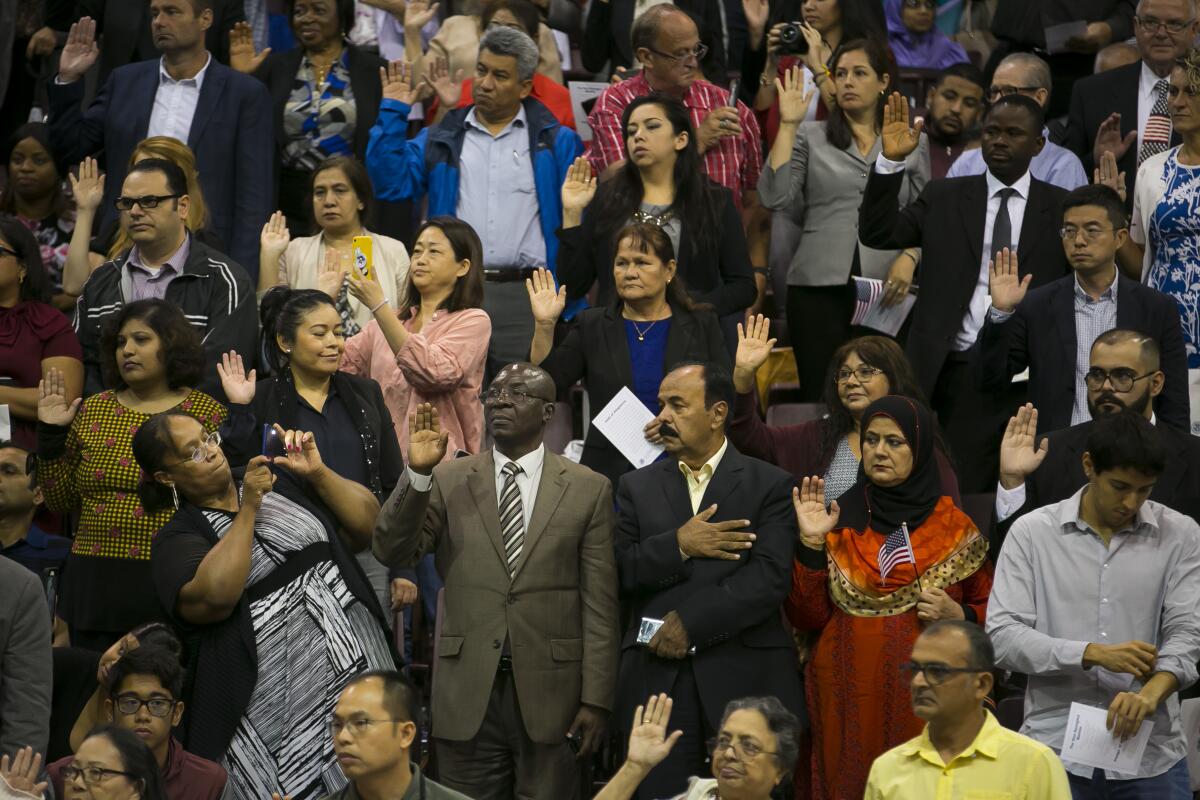
HOUSTON — This is where a nation changes: a public school auditorium that moonlights as a veritable citizenship factory.
At the M.O. Campbell Educational Center, where murals honoring the arts and sciences adorn the walls, U.S. immigration officials routinely hold packed naturalization ceremonies. Immigrants approved for citizenship walk in, take the oath of allegiance, and walk out as Americans — and as a small army of new voters.
“It will never, ever be easier to register than it is this morning,” U.S. District Judge Keith P. Ellison, who presided over a ceremony last month, told the 2,155 immigrants from more than 100 countries who had just taken their citizenship oaths. “The record for registrations is 89% of those who are sworn in.... Let’s see if we can break that record today.”
Amish Soni, a 34-year-old radiologist from India holding a small American flag, was one of the 85% who registered to vote that morning, aided by a volunteer from the League of Women Voters. He “definitely” plans to vote in 2020, partly because he thinks the healthcare system should be fixed, but also: “I’m not a big fan of Donald Trump.” And he’s far from the only one.
At ceremonies like these across the country, hundreds of thousands of immigrants are expected to receive their U.S. citizenship and become eligible to vote before November 2020, gently reshaping — and threatening — the electoral path that President Trump must thread to win reelection.
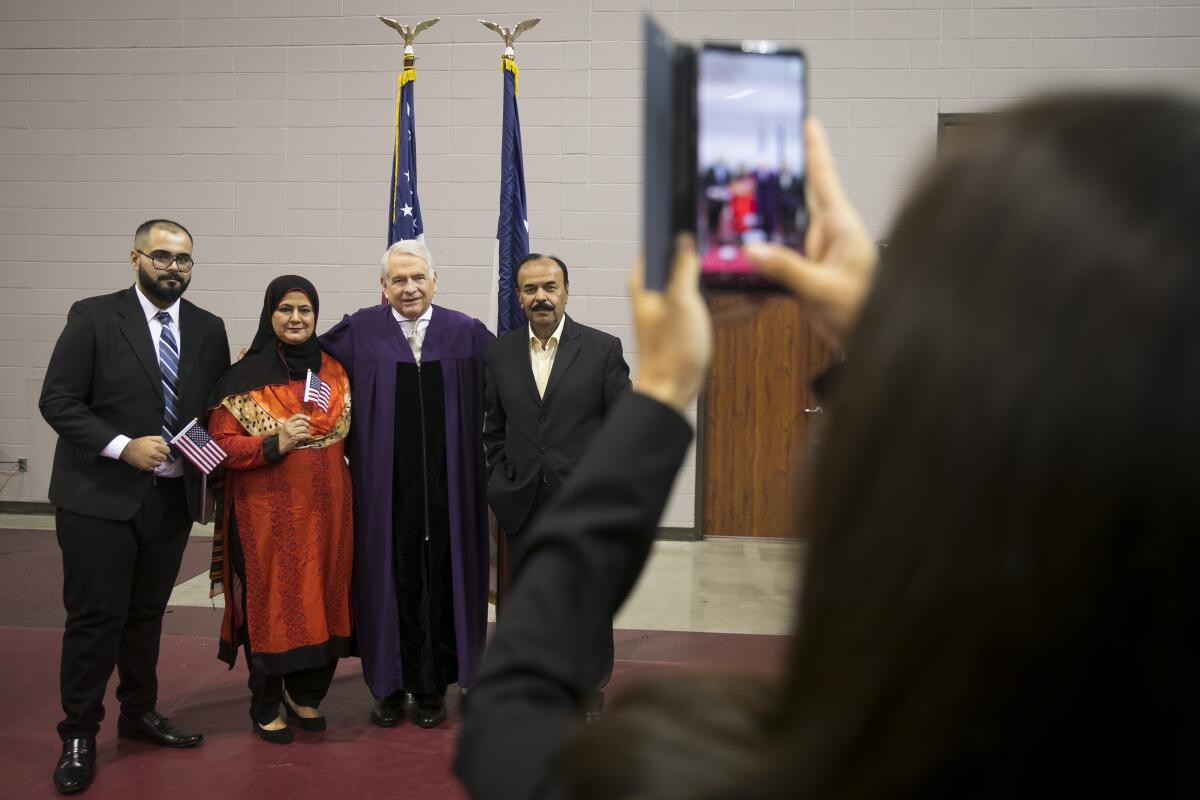
Over the last two decades, naturalized immigrants have grown into a force at the ballot box, with the United States recently swearing in more than 700,000 foreign-born U.S. citizens each year.
Naturalized citizens — who share the full legal rights of natural-born citizens, except for the ability to become president — cast more than 8% of the ballots in the 2018 midterm elections, almost double their share in the 1996 presidential contest, according to U.S. Census Bureau estimates.
Surveys show that many of the new citizens are liberal-leaning, which is one of several demographic trends helping put some historically red states such as Texas, Arizona and Georgia closer to Democrats’ reach.
The gains in immigrants’ electoral strength have been gradual. But Trump’s anti-immigration policies may be accelerating the trend by spurring even more people to naturalize and to vote, worrying some moderate Republican experts.
“It’s not ‘bad-ish’ news. It’s extremely bad,” said Mike Madrid, a Sacramento-based GOP consultant who studies Latino voters. He thinks the party’s use of anti-immigrant rhetoric to mobilize non-college-educated white voters will come at a steep electoral price. “This is a five-alarm fire.”
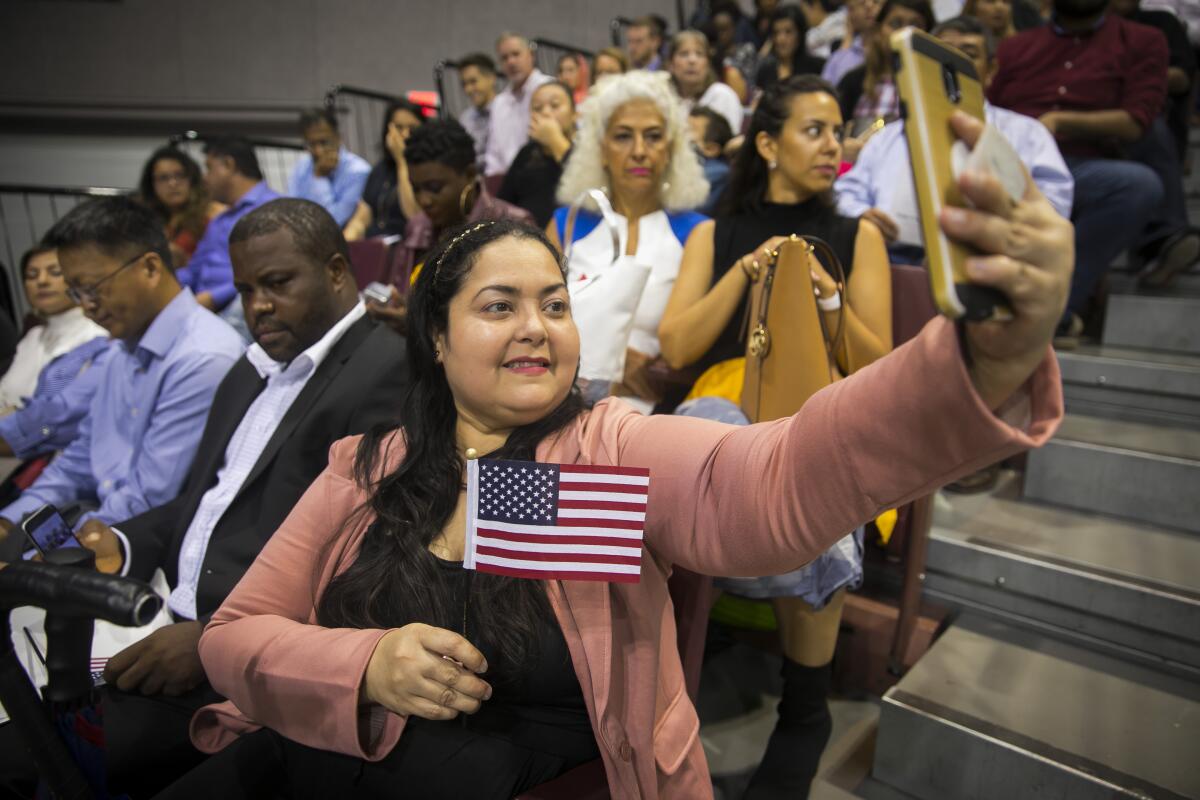
Some experts said the national climate reminded them of California in the mid-1990s, when heightened rhetoric against immigrants and the Proposition 187 ballot measure to prohibit services for some immigrants inspired a wave of eligible Latino immigrants to naturalize and register to vote.
It helped transform the home of Ronald Reagan and Richard Nixon into a nearly impenetrable Democratic stronghold.
“Republicans did not learn their lesson, and they have revived some of that anti-Latino sentiment,” said U.S. Rep. Norma Torres (D-Pomona), who was born in Guatemala and naturalized in 1996 so she could get more involved in politics.
The Trump campaign disagrees.
“Democrats make a mistake when they assume that all immigrants think the same way,” said campaign spokesman Tim Murtaugh. “Our own data shows that a great many legal immigrants agree with President Trump’s position on enforcing immigration laws, because they feel that if their families played by the rules, then other people ought to as well.”
Murtaugh declined to share the data, but he said the numbers are why Trump made a recent visit to New Mexico — a state he lost to Hillary Clinton by more than 8 percentage points — to court Latino voters.
Citizenship applications spiked in the two years before the 2016 election, which is common before a presidential contest. But instead of dropping as usual afterward, the number of filings grew in 2017 in the wake of Trump’s victory. The more than 800,000 citizenship requests in 2018 were also the most filed in a midterm election year in two decades.
“There are these surges in applications when immigrants perceive that it’s a time of crisis,” said Arturo Vargas, chief executive of NALEO Educational Fund, a nonprofit that promotes greater Latino participation in civic life. “We are going through a similar period right now at the national level, where immigrants are feeling a bit in the cross-hairs by the Trump administration.”
California voters who aren’t in a political party can vote in the Democratic presidential primary in 2020. Republicans, though, have excluded them.
According to data collected by the New Americans Campaign, a coalition of nonprofits, almost a third of U.S. immigrants hoping to naturalize this year were most interested in gaining the power to vote — the “top reason by far,” said Melissa Rodgers, the director of programs at the Immigrant Legal Resource Center, which runs the coalition.
Filing an application does not necessarily lead to naturalization; the denial rate is usually about 1 in 10. Immigrant advocacy groups have complained that the Trump administration has allowed a backlog to pile up, putting some applicants at risk of missing the 2020 election.
Latino and Asian immigrants are particularly potent additions to the electorate, with turnout rates that are often 5 to 8 percentage points higher than their natural-born counterparts, according to census estimates.
A September survey by Univision, conducted by the research firm Latino Decisions, said 81% of naturalized Latino respondents disapproved of the job Trump was doing as president; 12% said they were committed to voting for Trump in the 2020 election; and 64% said they planned to vote for the eventual Democratic nominee.
“A lot of folks are responding to the climate of fear and division and general intimidation against immigrant and refugee communities,” said Diego Iñiguez-Lopez, the policy and campaigns manager at National Partnership for New Americans, a coalition of immigrant advocacy groups. This year, the coalition launched a campaign to try to naturalize 1 million new citizens in time for the 2020 election.
Trump has been less unpopular with naturalized Asian immigrants, with a 38% approval and 52% disapproval rating, according to a 2018 survey by Asian and Pacific Islander American and AAPI Data. These voters reported supporting Hillary Clinton over Trump by 48% to 28%.
Midwestern moderates Pete Buttigieg and Amy Klobuchar are making a strong case against the liberalism of Sens. Elizabeth Warren and Bernie Sanders.
In recent decades, Asian Americans as a whole — the fastest-growing ethnicity in the country — had been generally more open to supporting Republicans. But the diverse group is increasingly becoming a reliably Democratic demographic, according to Karthick Ramakrishnan, a professor of public policy at UC Riverside who studies Asian American voting trends.
“What we’ve seen in the last two election cycles is either a crystallization or solidification in voting preferences and increasingly party preferences as well,” Ramakrishnan said.
Liking a party is one thing. Mobilizing to vote is another. Roughly three-fifths of foreign-born Asian American voters surveyed by APIAVote and AAPI Data said they were not contacted by the Democratic Party or the GOP before the 2018 election.
Language can be a barrier, and “a lot of folks don’t watch the same channels,” making people harder to reach through the media, said Harris County, Texas, Judge Lina Hidalgo, who immigrated to the U.S. in 2005 after fleeing Colombia and who became a U.S. citizen in 2013. Last year, the 28-year-old was among the Democrats who swept Republicans out of power in the county, where immigrants make up more than a quarter of the population.
Politicians need “to reach people where they are,” said Hidalgo, who appeared at last month’s ceremony to urge the new citizens to get involved in their communities and vote.
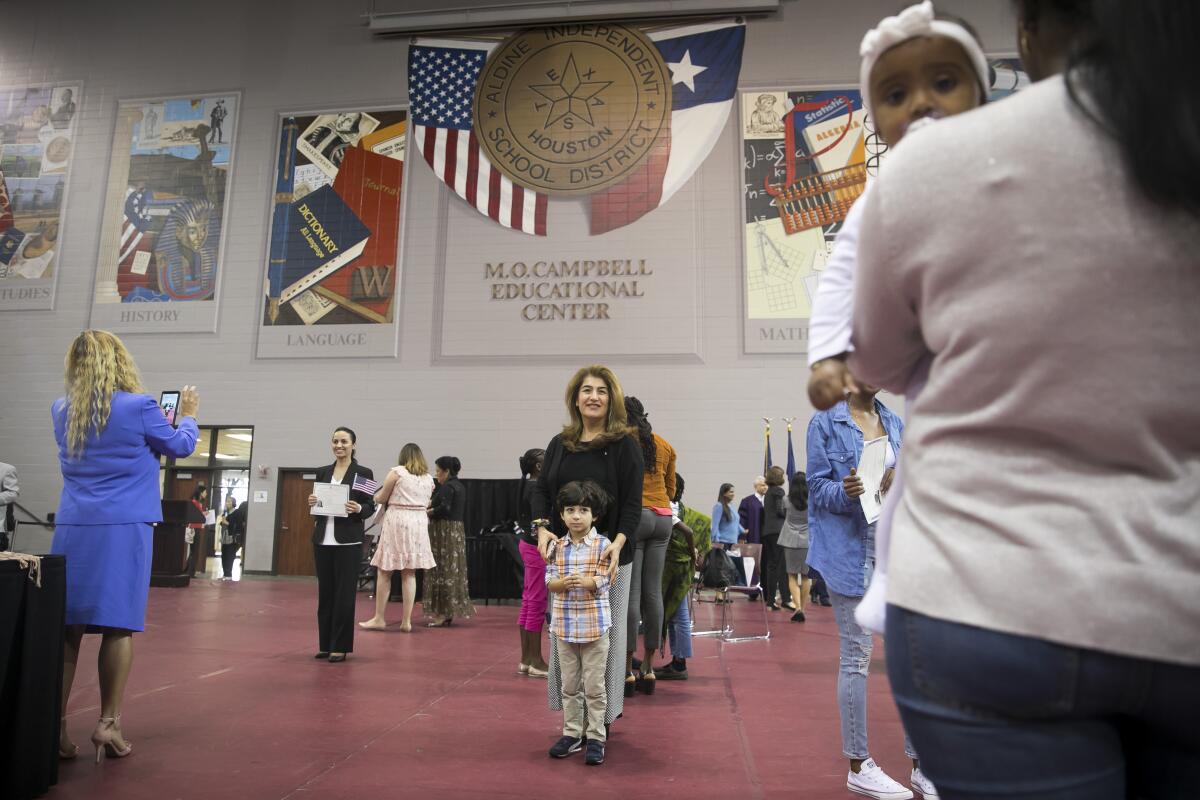
At the presidential level, naturalized immigrants’ voting power is largely diluted by the electoral college. New citizens most commonly settle in Democratic bastions such as California and New York, where their votes are not expected to affect the next presidential election.
Along with Texas, Florida is a key exception. The battleground state adds between 70,000 and 100,000 naturalized citizens each year, with more than 20,000 born in communist Cuba, a more conservative voter bloc that has helped Republicans maintain razor-thin majorities in the state.
Immigration is only one of several forces reshaping the electoral map, such as rural areas’ swing toward the GOP and the suburbs’ moves toward the Democratic Party.
Paul Bentz, a senior vice president of research and strategy at HighGround Inc., a traditionally Republican public affairs firm, said that younger voters, college-educated suburbanites and new residents from California are also helping push Arizona from red to purple.
“The president’s got big problems in multiple segments, not just naturalized voters,” Bentz said. He added that new voters are not monolithic, either, and that “border enforcement is not every Latino in Arizona’s No. 1 issue.”
Adrian Rios was closing in on his dream job as a U.S. diplomat when the unexpected happened: Donald Trump entered the White House.
At the Houston ceremony, new citizen Raul Borjas, 32, who was born in Venezuela, said he generally shares Republicans’ policy views.
“The U.S. has given me the freedom to express myself, which is particularly important to us as Venezuelans, who are losing that freedom in our country,” Borjas said, alluding to the political strife in his home country, as he waited to get his picture taken with the judge who administered his citizenship oath.
But he said he thought the party had fallen out of step on gun control policies, and he’s not sure whether he will vote for Trump.
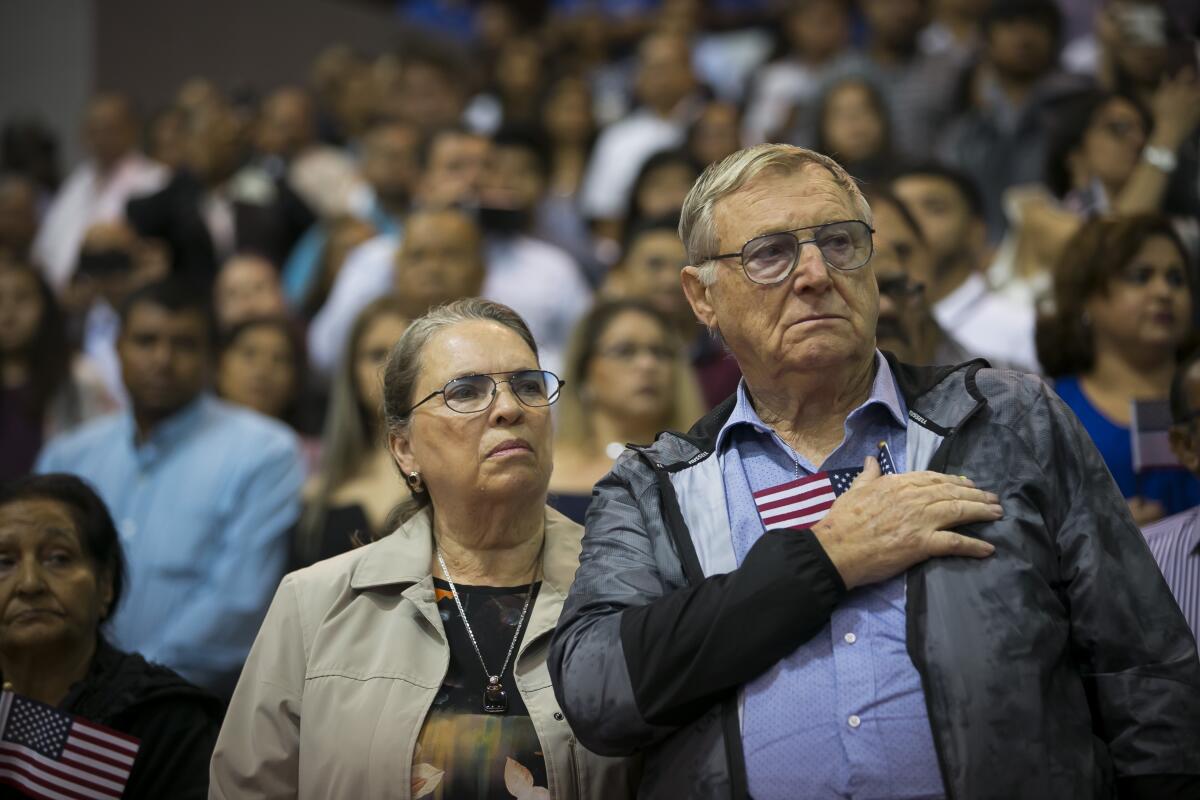
Hans Gottwald, 74, an Alvin, Texas, retiree, said he was born in Germany and has lived in the U.S. since 1963 after he served three years in the U.S. Army. He said he decided to become a citizen so he could vote in the next national election.
“I miss that I couldn’t vote for many years, but I think 2020 is very important to me,” Gottwald said. He’s not sure whether he’s going to support Trump or a Democratic challenger. He likes Sen. Elizabeth Warren of Massachusetts, but said, “I will not vote for a socialist,” apparently referring to Vermont Sen. Bernie Sanders.
Walter Martinez, 22, who was born in El Salvador and has lived in the U.S. since he was a young child, said he long felt like an American, and he wanted to naturalize as a citizen before it potentially became more difficult to do so.
He doesn’t see himself as very politically engaged, but he plans to vote in 2020 — and definitely not for Trump.
“No doubt,” Martinez said with a laugh, adding he doesn’t like the way the administration has treated Latinos.
“Maybe he knows money,” Martinez said of the president, “but I don’t agree how he is toward other people.”
More to Read
Get the L.A. Times Politics newsletter
Deeply reported insights into legislation, politics and policy from Sacramento, Washington and beyond. In your inbox three times per week.
You may occasionally receive promotional content from the Los Angeles Times.
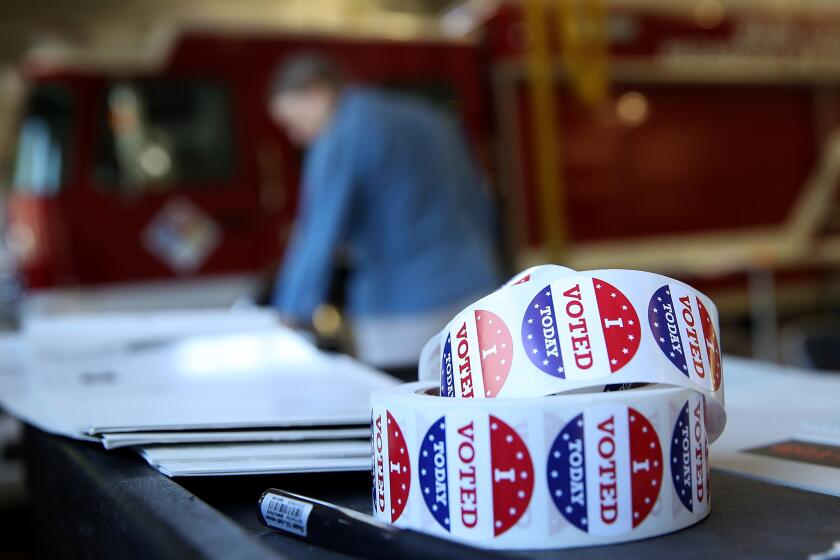
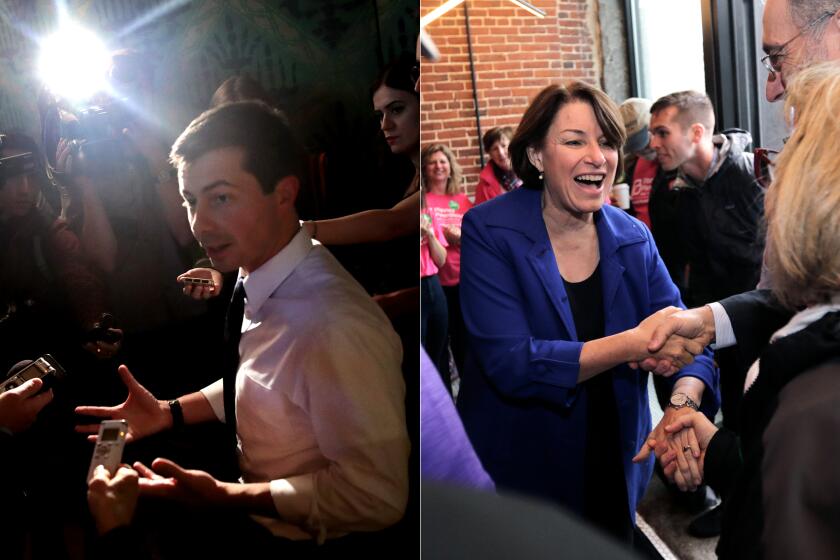
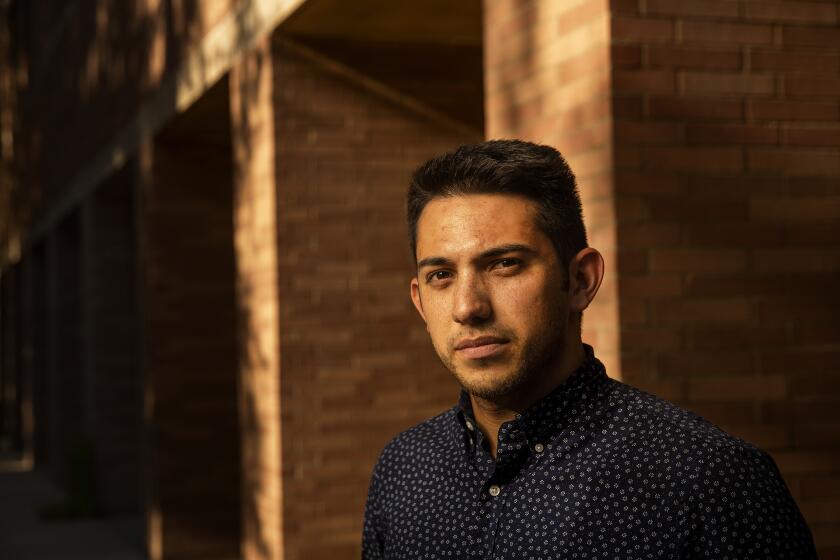
![[20060326 (LA/A20) -- STATING THE CASE: Marchers organized by unions, religious organizations and immigrants rights groups carry signs and chant in downtown L.A. "People are really upset that all the work they do, everything that they give to this nation, is ignored," said Angelica Salas of the Coalition of Humane Immigrant Rights. -- PHOTOGRAPHER: Photographs by Gina Ferazzi The Los Angeles Times] *** [Ferazzi, Gina -- - 109170.ME.0325.rights.12.GMF- Gina Ferazzi/Los Angeles Times - Thousands of protesters march to city hall in downtown Los Angeles Saturday, March 25, 2006. They are protesting against House-passed HR 4437, an anti-immigration bill that opponents say will criminalize millions of immigrant families and anyone who comes into contact with them.]](https://ca-times.brightspotcdn.com/dims4/default/d699c9b/2147483647/strip/true/crop/1977x1322+112+0/resize/320x214!/quality/75/?url=https%3A%2F%2Fcalifornia-times-brightspot.s3.amazonaws.com%2Fzbk%2Fdamlat_images%2FLA%2FLA_PHOTO_ARCHIVE%2FSDOCS%2854%29%2Fkx3lslnc.JPG)










